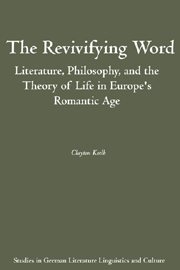Book contents
- Frontmatter
- Contents
- Preface
- Note on Abbreviations and Translations
- Part I Letter and Spirit
- Introduction: “The Dead Man's Life”: Romantic Reading and Revivification
- 1 “The Sound Which Echoes in Our Soul”: The Romantic Aesthetics of Matter and Spirit
- 2 “Spirit Thinks Only Through the Body”: Materialist Spiritualism in Romantic Europe
- Part II The Dead and Living Past
- Part III The Incarnate Word
- Conclusion
- Works Cited
- Index
2 - “Spirit Thinks Only Through the Body”: Materialist Spiritualism in Romantic Europe
from Part I - Letter and Spirit
Published online by Cambridge University Press: 05 February 2013
- Frontmatter
- Contents
- Preface
- Note on Abbreviations and Translations
- Part I Letter and Spirit
- Introduction: “The Dead Man's Life”: Romantic Reading and Revivification
- 1 “The Sound Which Echoes in Our Soul”: The Romantic Aesthetics of Matter and Spirit
- 2 “Spirit Thinks Only Through the Body”: Materialist Spiritualism in Romantic Europe
- Part II The Dead and Living Past
- Part III The Incarnate Word
- Conclusion
- Works Cited
- Index
Summary
What is not Life that really is?
— Coleridge, Theory of LifeI KNOW OF NO MOMENT IN THE HISTORY of modern European culture in which science and literature were more intrinsically interrelated” than in the Romantic age, wrote G. S. Rousseau in 1969 (131). The pursuit of science and the practice of poetry certainly worked comfortably together during the late eighteenth and early nineteenth centuries, sometimes even combined in the same person: Goethe was a particularly notable example. It would be equally true to claim that at no moment in European history were science and philosophy so closely interrelated, since what we call “science” was generally still called “natural philosophy,” and since major trends in the scientific thinking of the time actually emerged from contemporaneous developments in philosophy. Literature, science, and philosophy were therefore so closely bound together that they may be regarded as a single cultural phenomenon.
It would be impractical — and certainly far beyond my competence — to attempt here any thorough account of the scientific thinking of the Enlightenment and early Romanticism; instead I outline one particularly relevant conception of nature that runs through much of the eighteenth century and into the early nineteenth. Though there is no single origin for this line of thought, a reasonable start can be made with the Monadology (1714) of Gottfried Wilhelm Leibniz.
- Type
- Chapter
- Information
- The Revivifying WordLiterature, Philosophy, and the Theory of Life in Europe's Romantic Age, pp. 30 - 44Publisher: Boydell & BrewerPrint publication year: 2008



